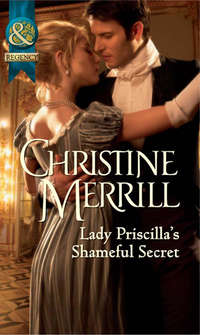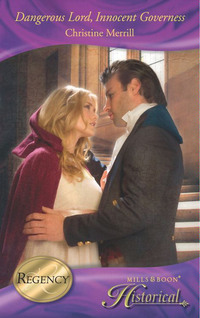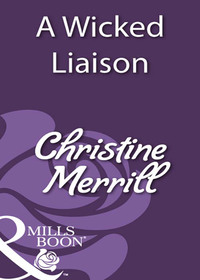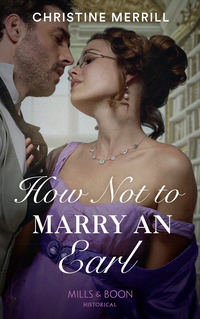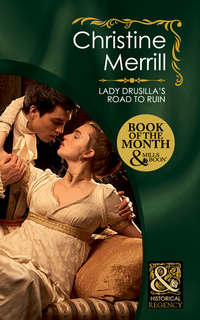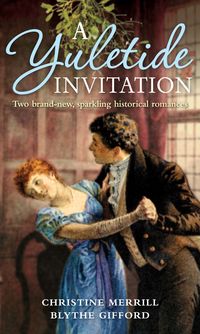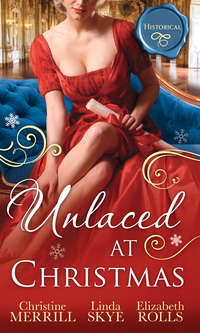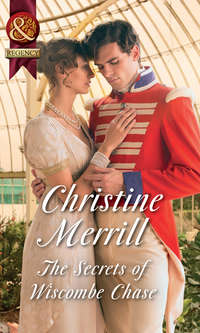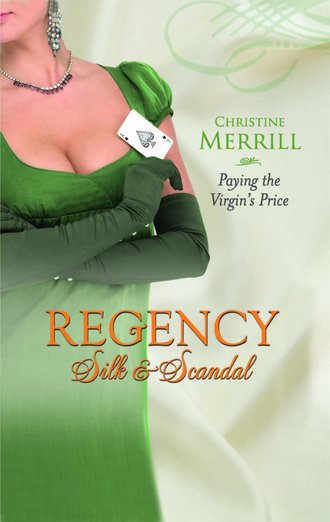
Полная версия
Paying the Virgin's Price
The hangman was placing the hood now, and a woman began to scream. He hoped it was his mother, come to take him home before he saw any more. His coming had been a mistake: there was nothing he could do and he did not want to see what was about to happen.
But it was a strange, dark-skinned woman leaning out of a window above the gallows. She was screaming in triumph, not fear, and her face had the beauty of a vengeful goddess as she stared down at the bound man and the laughing crowd.
And at him. She had found Nathan in the crowd, and stared at him as though she knew him. And then, she had shouted, in a voice so clear that the rabble had hushed to catch her words.
I call guilt to eat you alive and poison your hearts’ blood. The children will pay for the sins of their fathers, till my justice destroys the wicked.
She pointed at him as she spoke of children. And smiled. The adult Nathan screamed to the child to look away. The woman was mad. He should not mind her. And he should run from this place. If he did not, it would be too late.
And then, there was a thump, and his father’s body dropped as the floor under him disappeared. As he fell, so did the woman in the window, dangling from the silk scarf that was wrapped about her neck.
In his child’s mind, Nathan thought that the worst was over. But since then, the adult Nathan had seen enough in the Navy to understand what happened to a hanged man if there was no one to pull on his legs and help him to an easier death.
The kicking had begun. His father, and the garish puppet of a woman hanging from the window above him.
It had seemed like hours before the bodies stilled, the crowds had begun to part, and his mother had come for him.
When Nate woke, the bedclothes were wet with sweat and tears. And there was the Gypsy’s silk rope on the dresser beside him. Why had he bothered to pick the thing up and bring it home with him? The gesture was macabre, and meant to upset him. He had been foolish to play along. And Stephen Hebden had managed to raise the old nightmare to plague him.
But Stephen was not Stephen any more. His old friend was long gone. The man who had visited him was an enemy. A stranger. A Gypsy who was as angry and full of tricks as his mother had been. He must never forget that fact, or Stephano Beshaley and his curse would taint his present, just as the man’s mother had marked his childhood.
He might not be able to prevent the dreams, but during the day he would keep his mind clear of emotion, just as he did when he was at the gaming tables. His waking life would be no different, because of the Gypsy’s visit. At one time or another, Nate had endured public disgrace, loss, starvation and physical hardship. There was little left that could move him to fear, anger or joy. He’d held a hangman’s noose when he was still a child. The colourful rope on the night-stand—and its accompanying nightmare—did not compare to the horror of that day.
But his mind wandered to the people Stephen might search out when his plans for Nate failed. His sisters, perhaps?
Even a Gypsy could not stoop so low as to hurt innocent girls. Beshaley’s mother had stared directly at Nate as she’d said her curse. And he’d felt marked by the words, as if touched by a brand. Surely he was meant to pay the whole debt. Helena and Rosalind would be safe.
They had to be. How would the Gypsy even find them? When last Nate had seen them, they were tending their failing mother, waiting for him to come home. But he had lost them in the throng of strangers that was working-class London and had searched for them without success. Mother must have died, never knowing what had become of him, for she had been very sick, even before he’d disappeared. Helena and Rosalind were as lost to him as if they had never been born. It made him ache to think on it. But he could take some consolation in the fact that it would leave them safe from harassment.
Then who else would the Gypsy turn to, once he had failed with the Wardales? Did Nate owe Lord Narborough and his family a word of warning?
His own sense of injustice argued that he owed them nothing at all. They had heard about the curse as well. But they viewed it as little more than a joke. It had not scarred their lives as it had his. There was no sign that Marcus Carlow had been touched by fear. Nate should think of him as the Viscount Stanegate now that he had grown into his title. From the occasional mention of him in The Times, he had become just the man his father had hoped. Upright, respectable and honest. The sort of man that all their fathers had expected their sons to be.
If there was fault to be found, it did not lie with Marc or his siblings. It was their father who should bear the blame. Lord Narborough had claimed to be a friend of his father, but shut his doors to the Wardale family when they had needed help.
And Narborough had been the one to pin the blame on Father, when the murder had occurred. He had wasted no time in seeing to his apprehension and imprisonment.
It had gone so quickly. Too quick, he suspected. It was almost as though Narborough had seen the need for a scapegoat, and chosen William Wardale. Nate was sure, with all his heart, that his father was not a murderer. But someone had done the crime. And if there was a man alive who knew the truth, then it was most likely to be George Carlow. The murder had been committed just outside his study, after all. And he had been the one who called the loudest for a hurried trial and a timely hanging. Suppose his father had blundered on to the scene just after George Carlow had struck the fatal blow?
Nathan tried to muster some glee that the Gypsy would visit them next. The Carlow family was due for a fall. But he could find no pleasure in it. While he was sure that the senior Carlow was a miserable old sinner, the Gypsy had called for the punishment of the next generation. Would it be fair to see the curse fall upon Marc or his good-natured brother Hal? And what of their sisters, Honoria and Verity?
Nate thought again of his own two sisters, hiding their identities from the shame of association with the Wardale name. Even if George Carlow had been the true murderer, did the Carlow girls deserve to be treated as his sisters had? If Stephano Beshaley removed the protection of the older brothers, then brought about the downfall of the family, what would become of them?
Even if justice for Lord Narborough was deserved and forthcoming, could it not be delayed awhile? The girls were infants when he’d seen them last. They must be near old enough to make matches for themselves. If it was possible to stall the Gypsy, even for a month or two, then they would be safely out of the house and with families of their own, when retribution came.
It went against his grain, but Marc Carlow deserved some warning of what was coming, so that he could watch out for his sisters. They had all played together as children, and been good friends—until after the trial, when their prig of a father had forbidden further association.
Stephen had been there as well, of course. Once, they had been as alike as brothers. He forced the thoughts out of his head. With nostalgia would come sympathy and regret. And after that:weakness and fear. He could not afford to feel for the man who wished his destruction. Stephen Hebden had died in a foundling-home fire. And Stephano Beshaley was a bastard Gypsy changeling, who had turned on them the minute he had a chance.
And the man who had once been Nathan Wardale would not let himself be ruled by curses and grudges and superstitious nonsense any more than he had already. The Carlows would be no more happy to see him than he would be to go to them. But he did not wish them a visit from the Gypsy, now that Stephano had taken it into his head to resurrect the past and deliver vengeance where none was deserved.
Nate dressed carefully, as anyone might when visiting the heir to an earldom, and tucked the length of silk rope and its accusing knot into the pocket of his coat.
Chapter Two
Diana Price resisted the urge to place her head in her hands and weep in frustration. The Carlow daughters were pleasant, and she viewed them more as friends than a responsibility. But some days her job as their companion was not an easy one. ‘You will have to choose someone, Verity. The whole point of the Season is to find an appropriate match. It makes no sense to reject the entire field of suitors, before the rush is truly underway.’
She would have called the look on Verity’s face a pout, had the girl been prone to such. ‘I know what the point of coming to London was, Diana. But I had hoped that if Honoria would take care of the obligation and find herself a husband, then you would all leave off bothering me. Do you think Marc will force me to marry this year, even when I can see already that none of the available suitors are likely to suit?’
‘Your brother will do nothing of the kind, Verity. But if you claim that none of the gentlemen in London suit you, then you are far too selective.’
‘Only yesterday, Diana, you were criticizing Honoria for not being selective enough.’
‘Because she was not. It does not pay to encourage the advances of every man who shows an interest, Particularly not when you are as lovely as Honoria.’
Verity gave her an arch look. ‘And since I am not, I will be forced to marry a man who I do not love, just because he has offered?’
Diana reached out to hug the girl, who was quite as lovely as her sister, even though she lacked the older girl’s confidence. ‘That is not what I mean at all, dear one. It is simply that I do not wish you to discount gentlemen without giving them a fair hearing. You are young, yet. Though you might think that infatuation is the most important thing, it is not.’
‘And you, Diana, are not so old that you should confuse the words love and infatuation. They sound nothing alike.’
‘In tone, perhaps not. But when they are felt in a young heart, they can be easily confused. I am sure if you are given time, you will discover that there are much more important factors to consider when accepting an offer.’
Verity sighed. ‘Like money, I suppose.’
‘While it is nice, I doubt you will need to concern yourself with the wealth of your suitors.’ Any fortune hunters would have a hard time getting close, as long as Diana watched carefully. ‘I am thinking more of kindness, stability, common sense…’
Verity rolled her eyes. ‘All characteristics that can be gained with advanced age, I am sure.’
‘It is not necessary, or even advisable, for a husband to be quite so young as his wife. In some cases, it might be better for a wiser man to—’
‘Ugh.’Verity put her hands over her ears. ‘Do not talk to me further about the need to find a sensible old man to offset my youth and inexperience.’
‘Not old certainly, but—’
And now, Verity was shaking her head. ‘If that is the sort of man you wish for, then you had best find him for yourself. But as for me, I will choose in my own good time. Even if he is rash or foolish, if he loves me, I will accept him. We will learn moderation together.’
Diana sighed. The conversation was ending as it had several times before, with Verity stubbornly convinced that when it came for her, love would conquer all. In Diana’s experience, love was rarely a successful combatant against an uneven temper or an irregular income. ‘In any case, it is not something we need worry about today. If you find someone this Season who interests you—’
‘Which I shall not.’
‘—we will discuss his qualities before you make a decision. For now, it will please your father to hear that you are dancing and laughing, even if he is too ill to watch you.’
Verity sighed. ‘And there you have me, Diana. You know I will not refuse, if it is so important to the family. As long as I do not have to tie myself to that odious Alexander Veryan, just to make you all content. I swear, he is the biggest bore alive. The last time we danced, he trod on my toes half the night, while making sheep’s eyes.’
Diana smiled in sympathy, thinking of the rather awkward young man and his pitiful attempts to capture Verity’s affection. ‘Your father would welcome a connection to the Veryan family, but respectability is not the only quality to seek in a husband. I am sure, if we put our heads together, we will find you a more suitable beau than young Alex.’
There was a quiet knock upon the door of the dressing room, and a maid entered. ‘Miss Verity, there is a gentleman here. He wishes to speak with your brothers. But neither is home, nor expected. And Miss Honoria is…’ The servant paused respectfully.
‘Indisposed.’Verity looked helplessly in Diana’s direction. They both knew that Honoria, who had none of Verity’s reticence on the subject of marriage, had been up most of the night at a rout, dancing until nearly dawn. It would be quite beyond her to greet a visitor until noon, if then. ‘I am hardly dressed to entertain. But I will come as soon as I am able. In the meantime, Diana, could you?’
Stall, while the girl finished her morning chocolate? It was full on ten o’clock, and Diana Price had been up for hours. She could hardly blame the Carlow girls for sleeping late. But she still found it vaguely annoying when the girls’ suitors chose to arrive before lunch. With the men from the house, it left Diana in the awkward position of disappointing them. Until the girls had shown an attachment to any of the young men they had met, it would do the gentlemen little good to appeal to their older brothers on the subject.
She straightened her rather severe dress and put on her best chaperone’s frown. ‘I will see what it is about, Verity. If it is urgent, I will call for you. But if I do not, you may come down in your own good time. It serves the man right for arriving at this hour.’
Her friend gave her a relieved smile. ‘Thank you, Diana. I don’t know what I would do without you.’
She turned and walked out of the room and down the stairs to the salon. But the man waiting there came as a surprise to her, for he was a stranger. Her first impression was that he was far too old to be the usual post-ball suitor. His hair had not a touch of youthful colour left; It was a striking silver-grey. But on closer inspection, she could see that his back was straight, his skin tanned but smooth, and his green eyes had the clarity, if not of youth, then of a reasonable adulthood.
Physically, he was not much beyond her own twenty-seven years. But there was a quality in those eyes that spoke to her. They had seen much, and not all of it had been pleasant. But whatever hardship he had seen did not seem to have broken him. There was a solidness about him, as though he were made of stronger stuff than most men. With his striking appearance, it seemed to her as though an ordinarily handsome man had been cast as a statue, with burnished metal for hair and skin, and glittering gems for eyes.
Here was the sort of man she had wished for Verity: someone who could inspire confidence and trust as well as make the heart flutter. And apparently, even she was not immune from him, for she could not help smiling a trifle too warmly in greeting. ‘I am sorry to disappoint you. Lord Stanegate is from home. As is his brother. May I enquire as to the reason for your visit, Mister…?’ She left the sentence open, to remind him that he had not bothered to introduce himself.
He tilted his head and stared closely into her face, as though searching his memory, ‘Verity? Or is it Honoria? I cannot tell. It has been so long…’ He used the same puzzled tone that she had used, and there was a pause as he looked at her, a faint smile forming at his mouth. It was as though he had not expected her, any more than she had expected him. But the surprise had been a pleasant one. He was taking her in, just as she had him, forming opinions, searching for her past in her eyes.
Without thinking, she reached up to touch her hair, ready to push a loose curl out of the way, even though there was none. And then stilled her hands, and kept them demurely at her sides. ‘No, sir. I am companion and chaperone to the Carlow daughters. My name is Diana Price.’
She must have misjudged his stability after all. Her introduction seemed to stagger him, and for a moment, he tottered as though he were a feeble old man. He reached for the arm of the nearest chair, and unable to control the rudeness of his behaviour, dropped unsteadily into it, taking a deep gasp of air.
‘Sir?’ She stepped closer, ready to offer assistance. ‘Are you ill?’
‘No. Really. It is nothing.’
‘A glass of wine perhaps? Or a brandy?’ It was far too early. But the man needed a restorative.
He gave her the strangest smile she had ever seen. ‘Water, only. Please. The heat…’
‘Water, then. I will fetch it,’ she said, pretending to ignore his condition. It was barely past winter. There was no heat to speak of, nor was it particularly cold. But if the man wished to make excuses for an odd spell, it would do no harm to allow it.
She went to the carafe on a nearby table, poured out a tumbler, and brought it to him. As he took the glass from her hand, she felt the faintest tremble in his, as though the touch of her fingers had shocked him. He drank eagerly. When he set the glass down on the table beside him, a little of the colour had returned to his tanned face.
She sat in a chair opposite him so as not to call attention to his breach of etiquette.
He looked over and gave a weak smile of gratitude. ‘Thank you for your kindness. Forgive me…Miss Price.’ He took a breath. ‘My name is…Dale.’ His voice steadied again. ‘I am an old friend of the family, but it has been a long while since I have had reason to visit this house. When I was last here, Miss Verity was but an infant and Honoria not much older. And seeing you, knowing that they are out…I was overcome with how long it had been. Are the girls well?’
‘Yes, sir. Both are well-mannered and accomplished young ladies.’
‘And lovely, I am sure. Just as I am sure that their good behaviour is a testament to your steady influence.’ He fidgeted in his seat as though the burden of polite conversation was one that he was unaccustomed to. Then he stilled, as though gathering himself to the task at hand. ‘But my business today is with their brothers. You say they are from home. Will they be returning soon?’
‘Lord Stanegate is travelling with his new bride in Northumberland.’
‘Marc married, eh?’ Mr Dale got a distant look and he muttered, ‘Felicitations. And Hal?’
‘Somewhere on the Peninsula, I believe. He is a lieutenant in the Dragoons.’
The man nodded. ‘It would suit him, I am sure, the life and the uniform.’ And then he muttered, more to himself than to her, ‘Very well, then. They are both safely out of the way, and I will not worry about them.’
It was good to hear that he seemed concerned, although why he should feel the need to worry over Marc or Hal, or think that it was safer to face Napoleon than be in London, she was not sure.
And now, he was looking at her again, as though he had forgotten that she was in the room with him and could not think what to do next. Then he said, ‘If you could provide me with paper and pen, I would write a message to Marcus.’
‘If the matter is important, I can give you the address at which he can be reached,’ she offered.
Mr Dale waved a dismissive hand. ‘If he is happy and away from town, I would not dream of bothering him.’
‘Perhaps Honoria…’
‘No,’ he said a little too quickly. ‘Do not trouble the girls with this. I doubt it will involve them. This is a matter to be settled amongst gentlemen. And I would hate to think I’d been a source of worry to them. A brief note to Marcus will suffice. If you could relay it when he returns, I would be most grateful.’ He favoured her with another bright smile. And this time, she was sure that he was deliberately attempting to charm her. Most likely, he wished to make her forget his strange behaviour.
And it annoyed her that he had succeeded. He had a nice smile, friendly and unthreatening, yet a little knowing. There was something about the way that he sat in the chair, now he had recovered himself, that made her think he was usually an adventurous man. Wherever he belonged, it was somewhere much more exciting than a drawing room. As she got up and went to prepare the desk in the corner for writing, she could feel herself colouring at the thought that he was behind her and might be watching her move.
Had it been necessary of him to give flattering attention to a paid companion, just to get writing materials? She would have given him what he asked, even if he’d frowned at her, Diana thought. But his charming behaviour only stood to remind her how hopeless her fantasies might be. In a short time, he would be gone and she would be here, delivering the note like the servant she was. He would have forgotten all about her.
And she would be left with the memory of that smile.
Mr Dale came and sat at the place she prepared for him, at the tiny desk by the window. He thought for a moment, then scrawled a few words on the paper, blotted it, and stared at the sealing wax for a moment. Here he would show how little he trusted her with the contents.
Then he put the wax away, and looked directly into her eyes—the green light in his sparkled like emeralds—and his smile changed to a thoughtful frown. ‘Miss Price. I do not wish to trouble the girls with the reason for my visit. My fears for the Carlow family might be for naught. But you are their companion, are you not? A watchdog for their honour and reputation?’
Diana nodded.
‘Then should they receive the attention of a dark gentleman who calls himself Stephano Beshaley, know that he is a danger to them. Watch him carefully. And watch the girls as well, for he is just the sort to try and turn their heads. Should he appear, you must find Marc or Hal immediately and tell them. Can you do that for me?’
She nodded again, more puzzled than she had been before.
‘Very good.’ He handed her the folded sheet of paper. ‘You can give this note to either Stanegate or Lieutenant Carlow, when next they are home. Marcus preferably, since he is eldest and most responsible. But either will understand its meaning. Thank you for your time, Miss Price.’ He gave a short bow, and turned to leave.
‘Wait.’She held up a hand to stop him before realizing that she had no reason to call him back to her, other than an irrational desire not to let him go.
He turned back, an expectant look on his face.
‘If they wish to reply, where shall I direct the message? Or will you be returning?’
He gave the barest shake of his head. ‘Do not concern yourself. They will not wish to reply to me, any more than they wish a visit from Beshaley. But now, my conscience is as clear as I can make it. On this subject, at least.’ He gave her another strange look, as though he were apologizing for something, even though he had done her no wrong. ‘Good day, Miss Price.’And he was gone.
She walked slowly back up the stairs to Verity, with the note in her hand, wondering what she was supposed to do with the thing. She could forward it on to Marc on his honeymoon, she supposed. But he and Nell were not due back from Northumberland for weeks, and she hated to bother them. The time before their marriage had been stressful enough. Surely they deserved a few weeks of peace.
The paper before her was not sealed. Mr Dale had left it to her discretion. And although she would never peruse Marc’s mail under normal circumstances, perhaps this one time it would be better to read the message to see if the matter was urgent.
There was only one line, scrawled hurriedly in the centre of the paper.
Marc,
The Gypsy has returned.
Nathan.
Her breath caught a little in her throat. The words were ominous: black and spidery against the white of the paper. But it was nothing that she did not already know. Nor would Marc be surprised. He had explained to her what happened, before he left, the harrowing fight, the single shot, and the evil Gypsy who had been calling himself Salterton falling to his death in the icy water. Marc had cautioned her to be on her guard and watch the girls closely, in case he had been wrong. If the man lived, he might return to bother them.




